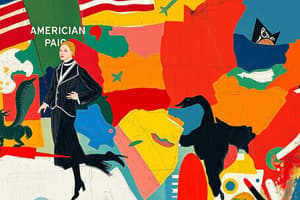Podcast
Questions and Answers
Who invaded the Dominican Republic in 1965 to control its affairs?
Who invaded the Dominican Republic in 1965 to control its affairs?
- The United States (correct)
- Nicaragua
- Honduras
- Cuba
Which U.S. action took place in Nicaragua in 1909 for seeking an independent foreign policy and diversifying international relations?
Which U.S. action took place in Nicaragua in 1909 for seeking an independent foreign policy and diversifying international relations?
- Overthrow of José Santos Zelaya (correct)
- U.S. interference in foreign elections
- Invasion of Iraq in 2003
- Aiding coups in Iran and Guatemala
When did the U.S. overthrow the kingdom of Hawaii?
When did the U.S. overthrow the kingdom of Hawaii?
- 1909
- 2003
- 1953
- 1893 (correct)
Who was the senior CIA officer sent with suitcases of money to orchestrate the regime change operation against Mohammad Mosaddegh in Iran?
Who was the senior CIA officer sent with suitcases of money to orchestrate the regime change operation against Mohammad Mosaddegh in Iran?
What was the main reason behind the U.S. intervention in overthrowing Iran's Mohammad Mosaddegh in 1953?
What was the main reason behind the U.S. intervention in overthrowing Iran's Mohammad Mosaddegh in 1953?
What did the Spanish-American War signify for the United States?
What did the Spanish-American War signify for the United States?
What role did Mark Twain play in relation to American foreign involvement according to the text?
What role did Mark Twain play in relation to American foreign involvement according to the text?
Which organization actively lobbied against taking territories like the Philippines and Puerto Rico?
Which organization actively lobbied against taking territories like the Philippines and Puerto Rico?
Why did the U.S. intervene in Nicaragua in 1909, resulting in the overthrow of José Santos Zelaya?
Why did the U.S. intervene in Nicaragua in 1909, resulting in the overthrow of José Santos Zelaya?
What was the main reason behind the U.S. intervention in overthrowing Iran's Mohammad Mosaddegh in 1953?
What was the main reason behind the U.S. intervention in overthrowing Iran's Mohammad Mosaddegh in 1953?
Flashcards are hidden until you start studying
Study Notes
- The United States has interfered in over 80 foreign elections between 1946 and 2000, not including U.S.-backed coups and invasions.
- James Woolsey, former CIA Director, acknowledged U.S. meddling in other countries' elections during an interview with Laura Ingraham, justifying it as being for a good cause.
- U.S. interventions in various countries include overthrowing the kingdom of Hawaii in 1893, aiding coups in Iran (1953) and Guatemala (1954), and invading Iraq in 2003.
- Stephen Kinzer, a former foreign correspondent, highlights the U.S. role in overthrowing Iran's democratically elected leader, Mohammad Mosaddegh, in 1953 due to nationalizing Iranian oil.
- The U.S. sent a senior CIA officer, Teddy Roosevelt's grandson, to Iran with suitcases of money to orchestrate the regime change operation against Mosaddegh.
- A documentary titled "Coup 53" sheds light on the 1953 British-American coup in Iran, revealing the involvement of figures like Kermit Roosevelt and Allen Dulles.
- Kinzer discusses U.S. intervention in Nicaragua, focusing on the overthrow of José Santos Zelaya in 1909 for seeking an independent foreign policy and diversifying international relations.
- The U.S. interference in Nicaragua set off a century-long cycle of American intervention, imposition of dictators, rebellions, repression, and the imposition of new leaders.- In 1965, the United States invaded the Dominican Republic to control its affairs due to the election of a leader, Juan Bosch, who wanted independence from the U.S.
- American corporations opposed leaders in the Caribbean who aimed to limit foreign corporate power and land ownership in their countries.
- The U.S. supported a coup in Honduras in 2009 against a president moving away from U.S. influence, leading to a fraudulent election and the current regime in power.
- Historical events such as the overthrow of Hawaii's monarchy, the Spanish-American War, and interventions in Cuba and the Philippines marked the U.S.'s shift from a continental to an overseas empire.
- The U.S. promoted rigged elections in Cuba and intervened when leaders not aligned with U.S. interests were elected.
- The Anti-Imperialist League, active around 1898-1900, opposed America's expansion outside North America and included influential figures like Andrew Carnegie, Jane Addams, Samuel Gompers, Booker T. Washington, and Grover Cleveland.
- The League lobbied against taking territories like the Philippines and Puerto Rico, sparking a national debate on American imperialism.
- The treaty to acquire territories outside North America was narrowly passed by the Senate, with the Anti-Imperialist League playing a significant role in the debate.
- Mark Twain was a prominent anti-imperialist figure, advocating against American involvement in foreign wars and proposing changing the U.S. flag to skull-and-crossbones symbols.
- Twain's strong anti-imperialist views have been somewhat overlooked in his public legacy, with many of his militant quotes not widely known or included in biographies.
Studying That Suits You
Use AI to generate personalized quizzes and flashcards to suit your learning preferences.




